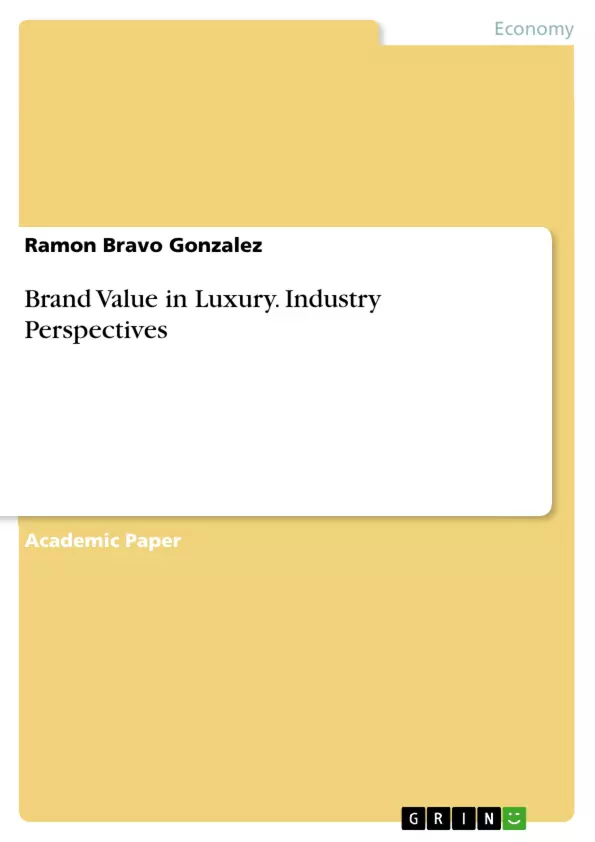The luxury industry has specific characteristics that set it apart from non-luxury, making non-luxury research not fully transferable into a luxury context. In our work, we conduct qualitative interviews with stakeholders and senior executives from some of the most important brands in luxury. We find that CSR and luxury are compatible and that CSR contributes to BV within luxury. We also identify how CSR is and could be positioned to maximize BV. Our findings not only contribute to the literature on BV, CSR and luxury, but highlight the strategic importance that CSR has for BV in luxury and make a case for the industry to embrace it. Our findings are especially relevant now that the industry is facing significant financial pressures as a result of the Covid-19 pandemic, which make it essential for luxury brands to look into ways to increase their BV.
Within luxury, the most valuable asset is brand value (BV). Non-luxury research has identified Corporate Social Responsibility (CSR) as one of the factors influencing BV. Luxury has not been typically associated with sustainability, but due to recent pressure from consumers and stakeholders many luxury brands are working toward implementing CSR initiatives.
Inhaltsverzeichnis (Table of Contents)
- Corporate Social Responsibility and Brand Value in Luxury: Industry Perspectives.
- Introduction
- Theoretical Background
- Key Characteristics of Luxury
- Brand Value
- Ethical Concepts
- Benefits of CSR Implementation
- How is CSR Approached within Luxury?
- Methodology
- Selection of Interviewees for Exploratory Interviews and ‘Credibility Checks'
- Interviewing and Analytic Approach
- Results and Discussion
- Exploratory Interviews
- 'Credibility Checks'
- Conclusion
- Theoretical Contribution
- Practical Contribution
Zielsetzung und Themenschwerpunkte (Objectives and Key Themes)
This research aims to understand the role of Corporate Social Responsibility (CSR) in building brand value (BV) within the luxury industry. The study utilizes qualitative interviews with stakeholders and senior executives from leading luxury brands to explore the compatibility of CSR and luxury, analyze how CSR contributes to BV, and identify strategies to maximize BV through CSR initiatives.
- The unique characteristics of the luxury industry that differentiate it from other sectors.
- The relationship between CSR and BV, particularly in the context of luxury brands.
- The strategic implementation of CSR within the luxury industry to enhance brand value.
- The potential of CSR to contribute to the financial sustainability of luxury brands, especially in light of current economic pressures.
- The evolving role of CSR within the luxury industry, considering recent trends and initiatives.
Zusammenfassung der Kapitel (Chapter Summaries)
- Introduction: This chapter sets the stage for the research by defining CSR and BV, highlighting the unique characteristics of the luxury industry, and emphasizing the need for a deeper understanding of CSR's role in BV within this specific sector. The introduction also discusses the growing importance of CSR in luxury due to consumer demands and recent industry initiatives.
- Theoretical Background: This chapter delves into the theoretical underpinnings of CSR, BV, and ethical concepts within the context of luxury. It explores key characteristics of the luxury industry, such as exclusivity, heritage, and craftsmanship, and examines how these elements contribute to BV. The chapter also reviews existing research on CSR and BV, highlighting the need for a specific focus on luxury.
- Benefits of CSR Implementation: This chapter examines the potential benefits of CSR implementation for luxury brands. It explores how CSR can contribute to building BV, enhancing brand reputation, fostering consumer loyalty, and attracting talent. The chapter also discusses the potential of CSR to mitigate risks and contribute to long-term financial sustainability.
- How is CSR Approached within Luxury?: This chapter explores the various approaches to CSR within the luxury industry. It examines different strategies and initiatives that luxury brands are employing, from the use of sustainable materials and ethical sourcing to philanthropy and comprehensive social and environmental programs. The chapter also explores the recent trend of luxury brands joining forces with other industry players in initiatives like the Fashion Pact.
- Methodology: This chapter outlines the research methodology employed in the study, including the selection of interviewees for exploratory interviews and 'credibility checks,' the interview process, and the analytical approach used to analyze the collected data.
Schlüsselwörter (Keywords)
The primary keywords and focus topics of this research are: CSR, corporate social responsibility, sustainability, luxury, brand value, brand equity. This study explores the interplay of these key concepts in the luxury industry, analyzing how CSR can contribute to building and maintaining BV within this specific sector. The research investigates the unique characteristics of the luxury industry, the strategic positioning of CSR, and the implications of CSR for the long-term financial sustainability of luxury brands.
- Quote paper
- Ramon Bravo Gonzalez (Author), 2021, Brand Value in Luxury. Industry Perspectives, Munich, GRIN Verlag, https://www.grin.com/document/1033531



